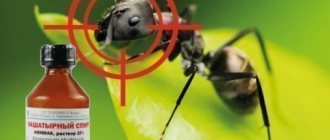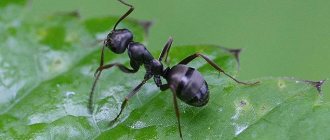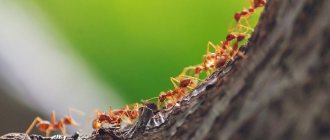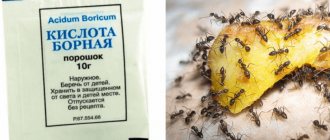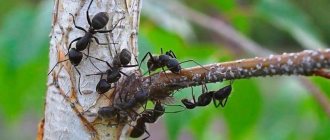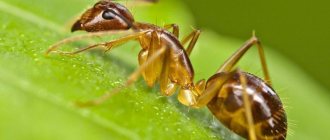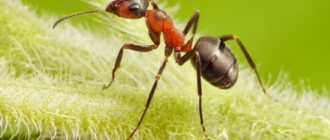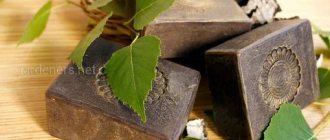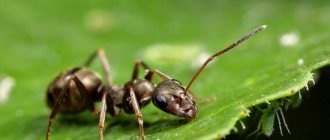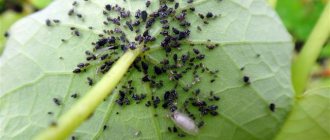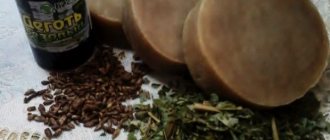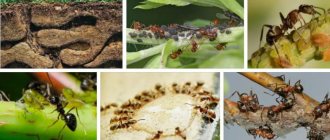Our gardeners and gardeners have been successfully using folk remedies for many years to combat the most malicious pests of summer cottages - ants, among which sodium bicarbonate takes pride of place. Soda for ants is often used. We can say that its cost is inversely proportional to its effectiveness: for a purely symbolic amount we get a product that can destroy a huge colony of pests, preserve the harvest and, in addition, improve the pH of the soil on our site.
If you have been unsuccessfully fighting an ant infestation for a long time, pay attention to the advice of experienced gardeners given in this article.
Why get rid of ants
Having discovered a huge anthill in our garden plot, rarely will any of us be delighted, except perhaps an avid entomologist. But it’s time for a gardener or gardener to sound the alarm. The appearance of ants does not bode well, and here's why:
these restless little workers destroy the roots of many cultivated plants;
if you decide to set up a garden bed in a place favored by ants and even managed to prepare expensive Dutch seeds, give up this idea - most of the seeds will be immediately eaten, and what will germinate will not please even the most optimistic gardener;
If a colony of ants has settled near the raspberry and strawberry beds, do not expect a big harvest - these insects are not averse to feasting on juicy sweet berries;
ants are very similar to us: just as we graze our little cows on lush fresh grass, they do the same thing, choosing the thinnest young shoots for grazing of their “farm animals” - aphids, as a result of which the plants wither and may even die;
if these insects have settled in the house, it’s also not very pleasant - will you really like catching ants from the soup or enduring their bites when some great traveler sets off to wander along your foot?
Fortunately, there are many simple, affordable remedies that will help cope with the invasion of these insects. One of them is baking soda.
Why Ants Are Unwanted
On the site, ants loosen the soil, enrich it with phosphorus and potassium, and sometimes destroy caterpillars (but these are more red forest caterpillars, not black garden ones) - but these are the only advantages from them. Otherwise, they are real pests:
- They breed aphids, transfer them to new plants, and help them overwinter. For them, aphids are a “pet”: the ants drink its sweet secretions. And it will not be possible to destroy aphids unless you first remove their “hosts”.
- Formic acid acidifies the soil.
- The ants grind down the roots of the seedlings, drag them away and eat the seeds.
- They eat sweet berries.
- They bite - not too painful, but unpleasant, especially for those with allergies.
- Insects from the site quickly climb into the house.
How does soda work?
In chemistry lessons we were taught that sodium bicarbonate can neutralize acids. Since the bodies of ants are literally saturated with acid, it will work successfully in this case as well. When pests eat soda, the following happens: reacting with acid, it leads to the destruction of the outer shell of insects, as a result of which they die. Since soda powder itself naturally does not attract ants, gardeners and gardeners invent ingenious compositions that, in addition to soda, include a variety of substances.
Soil safety
Naturally, every gardener, in such a situation, will be concerned about the question: “Will soda be even more harmful to the garden than ants?” Soda is an alkali, and the presence of such a group of substances in the soil is extremely undesirable. In fact, in order to disrupt the acid-base balance of the soil, more than 10 kilograms of soda per hundred square meters must be used. Thus, small amounts of the substance used to exterminate insects will not affect the quality of the soil in any way.
Benefits of Soil Powder for Insect Control
Soda has been used for many years by experienced gardeners and gardeners as a means of combating ants. As soon as a colony of these pests settles in your area, you must immediately take action, otherwise all your work will go down the drain.
The undeniable advantages of using soda in pest control include the following:
- this product is completely safe for you and me, and for our four-legged pets;
- There is probably a pack of soda in every home - besides, you can easily use expired soda for this purpose, its effectiveness has not become less effective over time;
- soda is a very effective substance that can repel pests from your beds, if not forever, then certainly for a long time;
- and finally, it is a truly universal substance that is combined with many available components, so it can be used not only on the site, but also indoors.
What problems do ants cause?
Despite their obvious usefulness, ants breed aphids, which destroy the foliage of garden plants and sometimes even cause their death. When built close to trees, anthills depress plants; soil acidity increases over time, which also negatively affects vegetation and reduces the yield of fruit crops. In addition, ants are not averse to feasting on the nectar of flowers and ripening sweet berries. Since families of insects that have settled on a site bring both benefit and harm, the issue of combating them must be decided separately for each specific case. You should also think about what folk remedies for ants in the garden are best to use, because there are a lot of remedies invented by gardeners, and they differ in the degree of effectiveness.
Recipes for preparing solutions
Everyone knows the passion of ants for everything sweet. If you want to quickly get rid of “uninvited guests” in the house or in the garden, pay attention to a mixture or solution that, in addition to soda, includes something sweet - powdered sugar or granulated sugar, fermented jam or vanilla sugar.
We offer you some of the most popular ant bait recipes.
Sweet bait
To make sweet ant bait, you will need regular baking soda and fine granulated sugar (you can replace it with powdered sugar). Mix a tablespoon of baking soda with the same amount of granulated sugar and mix well. Add a little water to give the composition the necessary viscosity. Mix everything again. Scatter the resulting bait in the place where the anthill is located, as well as along ant paths. Insects that have tasted the bait will soon die, and those who remain alive will rush to find a safer place.
Currently reading: Soda in the garden
Soda solution
The remedy is cruel, but extremely effective. If you are not prone to prejudice and are ready to destroy ants at any cost, try to put it into practice.
Take a large saucepan, pour two liters of boiling water into it and add five or six tablespoons of soda. Be careful, the liquid will begin to boil violently. Pour it into the anthill and immediately cover it with a layer of earth. For reliability, you can throw a piece of plastic film on top.
Soda-vinegar mixture
Another not very humane, but reliable and repeatedly proven insect repellent. Take a bottle of vinegar and a pack of soda with you to the garden. After stirring up the anthill with a long stick, fill it with soda powder and immediately pour vinegar over it. Place a thicker layer of soil on top and cover with a piece of black polyethylene.
As a rule, after this no one is left alive. But if after a month or two an ant colony appears again in the same place, we recommend treating it with the same product.
Baking soda and salt
Many gardeners speak positively about another means of combating insects - a mixture of equal amounts of soda and fine table salt. This mixture is generously sprinkled on the anthill itself and the area around it. To prevent ants from coveting the fruits and berries you have grown, you can sprinkle the powder around the tree trunks and the soil around the berry bushes. If you have a bag of ground pepper (allspice or black) in the house, add it to the main ingredients - it won’t be superfluous.
Potassium permanganate
Potassium permanganate can be used as a folk remedy for ants in the garden and aphids. Treating trees and other plants with a solution of potassium permanganate leads to the death of aphids. With the disappearance of the aphids, the ants will leave the area on their own. You can water anthills and the paths along which ants move with a dark solution of potassium permanganate.
Prepare a solution of potassium permanganate as follows: pour water into a liter jar, then add potassium permanganate until the solution acquires a bright, rich color; Next, take water into the bucket and gradually, stirring, add the prepared concentrate until the solution turns light pink.
A slightly colored solution can be used to spray trees.
Effect of use
Baking soda, especially in combination with boiling water and vinegar, begins to act immediately. In less than a few minutes, only a few dozen individuals will remain from the ant colony, hastily fleeing the danger zone. The majority of insects will inevitably die as soon as they come into contact with soda powder.
Those who survived will begin to build a new house. If the anthill was located near the fence, it is possible that the insects will temporarily move to the neighbors. However, it is too early to rejoice: if not this year, then next year they will certainly return to their previous place. If the ant colony was in the middle of the garden, those who escaped will most likely settle somewhere nearby, in a more secluded place, and at the first opportunity they will again occupy the territory you have conquered.
It turns out that you will simply chase uninvited guests around the garden, periodically reducing their number? Alas, this is the honest truth. Even if you cover all your 6 acres with soda and pour boiling water, you will only be able to completely get rid of the invaders for three to four years. And then... Then you will find them again, busily scurrying around the beds and with appetite eating the varietal strawberries you have lovingly nurtured.
Why are ants dangerous in the house?
Having occupied an apartment or house, ants can cause harm to the room itself and the people living in it:
- They carry mold fungi and pathogenic microbes (especially considering that ants enter the apartment from dirty, littered rooms, and other people's bathrooms).
- They carry leftover food throughout the apartment, filling cracks, crevices and other places that are difficult for humans to reach.
- They provoke rotting processes, which may be indicated by the appearance of an unpleasant odor.
- The waste products of these insects are the strongest allergens.
- Insects marching through the kitchen are not a sight for the faint of heart. For most of us, the presence of insects in our home is unpleasant. For those who suffer from myrmecophobia (a type of insectophobia associated with the fear of ants), it completely causes panic.
- Some species bite painfully, provoking an allergic reaction: redness, itching, swelling of the bite site. As a result, an inflamed area forms on the skin, which takes a painfully long time to resolve.
Insects that settle in apartments have jaws that are too small to bite, and from this point of view they are harmless to people. The same cannot be said about those brought in from a dacha or the street. Their bite can even cause anaphylaxis in some cases.
Soda for ants at home
The appearance of ants in an apartment or private house often turns into a real disaster. It is very easy to find an anthill in a garden or vegetable garden, but finding a nest of “tenants” in a house is not an easy task. As a rule, ants settle:
- in wall cracks;
- in the holes between the floor boards;
- under wallpaper that has fallen off the walls;
- in inconspicuous corners between closets;
- in an old non-working TV or an outdated tape recorder;
- in the trash can.
Watch where the chain of ants is heading. This is where their settlement will be.
Please note that several ant clans can peacefully coexist in a house at the same time.
Having discovered an ant's home, make about half a glass of hot soda solution and pour it into the crack where the ants disappear. In addition, you will need to mix a spoonful of soda with the same amount of powdered sugar and scatter it along the path of the ant columns. In the near future, uninvited guests will disappear from your home.
Currently reading: The most interesting reviews about the soda pregnancy test
Proven method
Among all the folk and chemical remedies we find soda and are surprised at the good reviews about it. It turns out that such a simple thing, which is in every home, can drive ants out of their home. It has been used on domestic ants for a long time, and garden ants are no exception. The reason for the success of soda must be sought in the chemical reaction that occurs between soda and acid, which is found in abundance in the ant’s body. For an ant, this reaction means a painful death, which is why, when processing ant colonies, their inhabitants hastily leave their homes.
In the greenhouse
If ants find their way into the greenhouse, you will have to act immediately. These insects are carriers of various diseases of cultivated plants and, even worse, destroy seeds and young shoots. Therefore, if you find a chain of ants busily seeping inside the greenhouse, immediately set water to boil in a large saucepan, and in the meantime prepare soda and a spray bottle. As soon as the water boils, very carefully add soda into it (a dessert spoon per liter of water), wait until the liquid boils, and cool until warm. Spray the greenhouse itself, the plants, and the soil underneath them generously with the prepared solution. It would be a good idea to spray the area around the greenhouse. The ants will disappear.
Quick solution
Insect bodies contain formic acid. Sodium bicarbonate has a neutralizing effect; when pests enter the body, soda disrupts their life processes. The effect appears within the first hours after use. This safe and inexpensive product additionally has an antibacterial effect, suppressing the development of pathogenic flora in the soil.
Soda. The illustration for the article is used under the standard license life-hacky.ru
Depending on the number of ants, you can use a solution of weak or strong concentration. Preparation and method of use:
- Dissolve 50 g of sodium bicarbonate in 10 liters of water. The liquid will protect the beds from ant attacks. Carefully spray the plantings with the solution, avoiding contact with the leaves. In greenhouses, it is necessary to treat not only the soil, but also the frames and the ground outside the greenhouse (along the walls).
- Dilute 3 tbsp in 1 liter of water. l. soda A concentrated solution is used to destroy the anthill. Pour the liquid onto the insects' home, which is then covered with turf and cling film.
The last method is effective, but tough. When processing, you should protect the skin of your hands so that there are no burns.
How to remove ants using traditional methods
Over hundreds of years of unequal struggle against ants, humanity has tried, it seems, almost all the means at its disposal. Many of them turned out to be quite effective. If you shudder at the sight of an anthill, you can use the recipes below.
Boiling water
The easiest way to reduce the ant population in your garden is to pour boiling water over their colony. Prepare at least 5 liters of boiling water. Disturb the ant colony and pour boiling water over it, trying to capture not only the center, but also the soil around it. There's no need to rush. After all, your goal is to destroy as many insects as possible. Make sure that the boiling water properly scalds not only the surface of the soil, but also penetrates into the depths. You may have to repeat the procedure several times or add some powerful insecticide to the boiling water to achieve the desired effect.
Attention! Be very careful! It’s easy to get burned by boiling water in the garden. Remember, there should be no children or animals nearby.
Birch tar
Do you feel sorry for destroying innocent insects? In this case, you should try to drive them away from your site.
Birch tar will help you with this. Moisten the pressed sawdust generously with tar, steam it with boiling water, and when it swells well, scatter it around the perimeter of the beds. Don't forget about the anthill. Cover it with tar-fragrant sawdust. You will see that soon the insects will leave their home, unable to bear the pungent smell.
As soon as you feel that the tar smell has begun to fade, process the sawdust again.
Ammonia
One of the effective remedies against ants is ammonia. It is not only capable of expelling pests from the site, but also serves as an excellent nitrogen fertilizer, which is no less important for gardeners. Ammonia is used in the garden in the following way: a piece of thick cotton fabric is soaked in this product, thrown over an anthill, and immediately covered with thick plastic film on top to prevent the ammonia fumes from escaping. The sharp smell of ammonia will drive away the ants and they will not appear in this place for a long time.
Currently reading: Superglue and baking soda
Ash
All gardeners know and appreciate ash as a wonderful fertilizer. But the range of its action is much wider than it seems at first glance. Its infusion is successfully used to combat ants and other pests, and its dry form is used to prevent various diseases of cultivated plants.
To prepare an ash infusion, a three-liter jar of sifted wood ash is poured with a bucket (10 liters) of boiling water. Leave for 48 hours, then filter, add 3 tablespoons of liquid laundry soap to the infusion, stir vigorously until foam forms, allow it to settle, and then spray your plantings with the resulting liquid.
If you have accumulated a lot of ash, it is useful to sprinkle it on the soil in the beds, around fruit trees and shrubs.
Black and red ground pepper
If you have a bag of expired pepper, red or black, lying around, you can put it to work: dust the soil in your garden beds with it. Pepper will repel ants.
In the fall, did you save a couple of bottles of capsicum tincture in case of radiculitis, but never used them? Dilute them with warm water (1 bottle of tincture per two glasses of water), pour into a spray bottle and spray your plantings. Be careful! Work only in a gas mask or respirator!
Cinnamon powder
Ground cinnamon helps repel ants. Sprinkle it on the places where the largest concentration of insects is observed. They will change their route. This product is convenient to use in residential premises, but it is less effective outdoors.
Plants that repel ants
If you don't like the idea of destroying hard-working insects, you can plant plants that have a pungent odor along the beds. These can be edible plants (onion, garlic, parsley or mint), flower crops (tagetes, cloves) or medicinal herbs (valerian, tansy).
We hope you find the information you gleaned from this article helpful!
RESULTS
RESPONSIBILITY RESULTS RESULTS µÐ¹. OPTIONAL RESEARCH SOLUTION.
RESULTS, RESULTS, RESEARCHES RESEARCH, RESEARCH ²Ð¾Ñ:
- 10-15 г беÑезовой ÑмолÑ;
- 50 rubles;
- 10 водÑ.
RESULTS RESULTS.
RESULTS RESULTS °ÑÑений. RESULTS RESULTS.
RESULTS, CONDITIONS, CONDITIONS, CONDITIONS ´Ð¸ÑелÑми помогÑÑ Ð²Ð°Ð¼ избавиÑÑÑÑ Ð¾Ñ Ð²ÑµÐ´ RESULTS.
Reviews
Gennady, St. Petersburg
“In our dacha, right in front of the entrance to the house, we have a beautiful flowerbed. David Austin roses of the “Golden Celebration” variety grow on it - a real decoration of our site. For quite a long time they felt great, but one day I noticed that one of the bushes began to wither, lag behind in development, and refused to bloom. Having carefully examined the diseased plant and the soil around it, I discovered that an anthill had grown right at its roots. The bush could no longer be saved, so I removed it and sprayed the empty area with insecticide. In the spring I planted a new bush there, and in the summer history repeated itself. This time I decided to use a folk remedy: I treated the soil with soda solution. There were no ants for three years, but then another bush died and I realized that the game was lost. I didn’t plant any more roses in this place, I edged the bushes with a border of white alyssum and left the ants alone. We have been peaceful neighbors for four years now, not a single plant has gone missing.”
Olga, Rostov-on-Don
“I can’t hear about how summer residents kill ants, and even use such barbaric methods - my blood runs cold! Is there really no way to scare them away? It would be much more humane, and there would be no damage to the crop. I just want to ask: “What if some giant disturbed your dacha and he began to sprinkle caustic powder on you and pour boiling water on you?” What would they answer me? Let's treat our neighbors on the planet at least a little kinder!”
Pests that attack cabbage
The number of insects that harm cabbage beds is small, but the problem is that they are very difficult to remove.
- Cruciferous flea beetle. A small jumping insect that destroys three times its own weight in green leaves in one day. Young crops and Chinese cabbage suffer the most.
- Caterpillars. The eggs laid by the butterflies are hatched and voracious caterpillars are born, which are capable of destroying many heads of cabbage.
- Aphid. Green insect. Affects young plants. The leaves curl and black spots appear on them.
- Cabbage fly larvae. Destroy the underground part of the plant.
- Slugs and snails. Nocturnal pests that are difficult to catch during the day. And they cause a lot of harm, because all they do all night is eat.
How to use the solution as a fertilizer
The drug is used to normalize soil with high acidity; in acidic soils, most plants grow and bear fruit poorly. The soil is watered with sodium bicarbonate solution and loosened with a rake. This is done in the spring - before planting plants in open ground or in the fall - after harvesting.
The use of soda solution as a fertilizer for cabbage (not a full teaspoon of soda, 10 grams per 5 liters of water) allows the crop to be stored better and increases the shelf life of heads of cabbage. Water the plants several times a season, from the moment the plants are planted in the ground until the fall.
How to prepare the solution
It is very simple to prepare; you just need to dissolve the recommended amount of dry soda in warm, clean water. For example, to treat cabbage beds against aphids, use 5 tablespoons of dry matter per 10 liters of water. Do not use water warmer than +50 °C.
Important: the solution is not prepared in a metal container; a glass or plastic container is perfect.
It should be used within 2-3 hours. Store the opened pack in a dry place, use a dry spoon for work; if there is high humidity in the room, you should put the powder in a tightly closed container made of plastic or glass - soda is hygroscopic (absorbs moisture from the air). Dry powder is also used to treat cabbage beds.
Advantages of using a solution with soda
The first and main advantage of baking soda is the effectiveness of its use in cabbage beds, for processing other vegetables and fruit trees. The second important factor that makes it popular is the safety of using sodium bicarbonate solution for plants, animals and humans.
Additional advantages of use are the widespread availability of the product (it is difficult to find a grocery store that does not sell a pack with a familiar design) and the low cost of the product.
Infusions for processing
You can prepare various herbal infusions yourself. Treat the plantings with them and reduce the number of harmful insects.
- Onion peels, tomato tops (from aphids and caterpillars). Take 500 gr. husks, add 2 l. boiling water, leave for 1-2 days. Then add 2 liters of water and 1-2 tbsp. spoons of liquid soap. Brew 1.5–2 kg of tomato tops into 5 liters. water, let stand for 4 hours, then boil for 3 hours. Strain and mix with water 1:2 (decoction - water). After both infusions are ready, they are mixed in a 1:1 ratio. The resulting mixture can be used to process cabbage.
- Ash, tobacco dust, mustard and liquid soap. A glass of ash, a glass of tobacco dust, 1 tbsp. a spoonful of mustard and 1 tbsp. spoon of liquid soap, pour boiling water (10 l.) Leave for a day. Treat beds with cabbage from aphids.
- Ash and tar shampoo. 1 cup ash, 1–2 tbsp. spoons of shampoo and 5 l. water. Leave for a day and spray against caterpillars on cabbage and cruciferous flea beetles.
See also
How to treat or spray cabbage against pests using folk remediesRead
